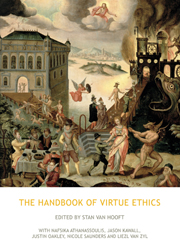Book contents
- Frontmatter
- Contents
- Acknowledgements
- 1 Introduction
- PART I NORMATIVE THEORY
- PART II TYPES OF VIRTUES
- PART III APPLIED ETHICS
- 29 Virtue in the clinic
- 30 Virtue ethics and management
- 31 Virtuous leadership: ethical and effective
- 32 Virtue ethics in the military
- 33 Sporting virtue and its development
- 34 Key virtues of the psychotherapist: a eudaimonic view
- PART IV THE PSYCHOLOGY OF VIRTUE
- Contributors
- References
- Index
31 - Virtuous leadership: ethical and effective
from PART III - APPLIED ETHICS
- Frontmatter
- Contents
- Acknowledgements
- 1 Introduction
- PART I NORMATIVE THEORY
- PART II TYPES OF VIRTUES
- PART III APPLIED ETHICS
- 29 Virtue in the clinic
- 30 Virtue ethics and management
- 31 Virtuous leadership: ethical and effective
- 32 Virtue ethics in the military
- 33 Sporting virtue and its development
- 34 Key virtues of the psychotherapist: a eudaimonic view
- PART IV THE PSYCHOLOGY OF VIRTUE
- Contributors
- References
- Index
Summary
Many institutional failures and disappointments within Western culture are due to bad leadership. Bad leadership may be “ineffective” or “unethical” or – as is often the case – it may be both (Kellerman 2004). The era of modernity was inclined to attribute credibility to incredible leaders, to the celebrity heroes of politics and progress. Today, the confidence and surety once placed in those who lead has perished in waves of corruption and duplicity. Expertise, charisma and competitiveness, elements of what Alasdair Maclntyre (1984) calls modernity's “moral fiction”, have been unveiled as insufficient (at best).
As a result, scholars and citizens wonder whether a leader's good character can be a credible source for “ethical leadership” that is also “effective leadership” (Cameron 2003; Ciulla 2012). Followers want leaders who are trustworthy. They want leaders who are authentic. Organizations need leaders who are good, leaders whose vision and performance are an outgrowth of their virtue.
In this chapter, we make a case for virtuous leadership, not only because it makes character the foundation for ethical practice, but also, we purport, because leaders who are virtuous are effective in their call to lead. What follows is the result of a dynamic dialogue about virtuous leadership based in classic literature and the current research on leadership from the behavioural sciences. The outcome is a robust argument for the development and deployment of good leaders.
- Type
- Chapter
- Information
- The Handbook of Virtue Ethics , pp. 352 - 364Publisher: Acumen PublishingPrint publication year: 2013

